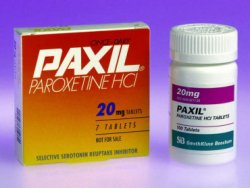Paxil (paroxetine) Coupons and Discounts
Sarafem (fluoxetine) is a drug that belongs to the group of antidepressants. One way to save money on the Sarafem (fluoxetine) retail cost regardless of income and insurance status is to use Sarafem (fluoxetine) coupons or discount cards from RXCoupons. Use our Sarafem (fluoxetine) coupons at your online pharmacy and receive up to 75% off the sale price each time you refill your prescription.
Paxil (paroxetine) action
Paxil (paroxetine) is a drug with antidepressant action. It belongs to the group of selective serotonin reuptake inhibitors and is similar to the tricyclic antidepressants. The drug has antidepressant and anxiolytic effects. It is used to treat all types of depression, obsessive-compulsive disorders, panic attacks, social phobias and other anxiety disorders.
Paxil (paroxetine) indications
Treatment of all types of depression, including reactive depression, severe depression and anxiety disorders. The drug is effective in preventing relapse of depression. It is used to treat panic disorder with agoraphobia, obsessive-compulsive disorder, social phobia, generalized anxiety disorder, posttraumatic stress disorder.
Paxil (paroxetine) contraindications
Paxil is contraindicated in the following cases:
- Simultaneous treatment with MAO inhibitors, thioridazine, pimozide, and methylene blue;
- Pediatric patients (younger than 18 years old);
- Pediatric patients younger than 7 years old (treatment of various states with the exception of depression);
- Increased sensitivity or allergic reaction to the drug components.
Paxil (paroxetine) method of use and dosage
Paxil tablets should be taken whole, without chewing, in the morning (with food).
The following dosing regimen is recommended (daily dose, 1 time per day):
Depression: 20 mg (initial dose). If necessary, a gradual increase in dose is possible (10 mg every 7 days up to 50 mg). Duration of the course lasts up to several months.
Panic disorder: 10 mg (initial dose). If necessary, a gradual increase in dose is possible (10 mg every 7 days up to 40/60 mg). Duration of the course lasts up to several months or longer.
Social phobia, generalized anxiety and posttraumatic stress disorder: 20 mg (initial dose). If necessary, a gradual increase in dose is possible (10 mg every 7 days up to 50 mg). The dose should be reduced gradually to avoid withdrawal symptoms.
Elderly patients should start with a recommended initial dose, which can be gradually increased to 40 mg per day. Patients with severely impaired renal function should use reduced doses of Paxil.
Paxil (paroxetine) side effects
Some of the following side effects can vary in intensity. Patients may experience the following side effects:
Respiratory system: yawning.
Nervous system: dizziness, tremor, headache, extrapyramidal disorders, akathisia, seizures, serotonin syndrome (hallucinations, agitation, confusion, sweating, hyperreflexia, myoclonus, tachycardia and tremor).
Cardiovascular system: postural hypotension, sinus tachycardia.
Hepatobiliary system: liver failure, hepatitis, jaundice.
Haematopoietic system: abnormal bleeding, thrombocytopenia.
Gastrointestinal tract: nausea, dry mouth, vomiting, diarrhea, constipation, gastrointestinal bleeding.
Immune system: allergic reactions (including angioedema, urticaria).
CNS: agitation, insomnia, somnolence, nightmares, hallucinations, confusion.
Urinary system: urinary retention, urinary incontinence.
Metabolism: decreased appetite, increased cholesterol levels, hyponatremia.
Reproductive system: sexual dysfunction, hyperprolactinemia.
Skin reactions: sweating, skin rash, severe skin reactions, photosensitivity reactions.
Other side effects: weight gain, fatigue, peripheral edema.
When you stop the therapy, the following disorders may develop: sleep disorders, anxiety, headache, dizziness, confusion, diarrhea, nausea, sweating, agitation, tremor.
Paxil in children may cause the following side effects: emotional lability (including suicide thoughts, mood swings), sweating, hyperkinesia, decreased appetite, agitation, tremor.
Paxil (paroxetine) special instructions
Paxil can increase the risk of suicidal behavior. Therefore, such patients should be carefully monitored, especially in the early course of treatment. Keep in mind that in some cases Paxil can lead to akathisia (restlessness and agitation).
Paxil treatment should be discontinued if there are symptoms such as myoclonus, hyperthermia, muscle rigidity and acute mental status changes, including confusion and irritability.

